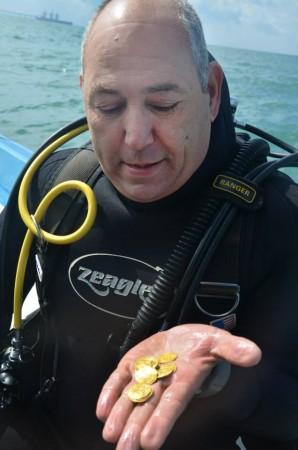
Members of a diving club stumbled upon the largest trove of gold coins ever found off Israel's Mediterranean coast. Almost 2,000 pieces coins from the Fatimid period (11th century CE) were spotted on the seabed in the ancient harbour in Caesarea National Park.
Initially misunderstood to be toy coins from a game, the discovery of the gold coins was later reported to the Marine Archaeology Unit of the Israel Antiquities Authority. Almost 2,000 gold coins in different denominations -- a dinar, half dinar and quarter dinar -- dimensions and weight were discovered with the help of a metal detector.
"The discovery of such a large hoard of coins that had such tremendous economic power in antiquity raises several possibilities regarding its presence on the seabed," according to Kobi Sharvit, director of the Marine Archaeology Unit.
One of the theories regarding the presence of the gold coins on the sea bed is that a treasury boat, on its way to the central government in Egypt with taxes that had been collected, must have wrecked mid-journey. Another one goes that a large merchant ship that traded with the coastal cities and the port on the Mediterranean Sea sank and gold coins got dumped in the ocean.
"The coins are in an excellent state of preservation, and despite the fact they were at the bottom of the sea for about a thousand years, they did not require any cleaning or conservation intervention from the metallurgical laboratory," said Robert Cole, an expert numismaticist with the Israel Antiquities Authority. He also added that "Several of the coins that were found in the assemblage were bent and exhibit teeth and bite marks, evidence they were "physically" inspected by their owners or the merchants."
The Marine Archaeological Unit hopes to conduct salvage excavations in the area and better understand the entire archaeological context of the priceless treasure uncovered by chance.


!['Kaise ho bhai..': PM Modi shook hands with Akshay Kumar at a media summit in Delhi [Watch] 'Kaise ho bhai..': PM Modi shook hands with Akshay Kumar at a media summit in Delhi [Watch]](https://data1.ibtimes.co.in/en/full/806317/kaise-ho-bhai-pm-modi-shook-hands-akshay-kumar-media-summit-delhi-watch.jpg?w=220&h=135&l=50&t=40)


!['Kaise ho bhai..': PM Modi shook hands with Akshay Kumar at a media summit in Delhi [Watch]](https://data1.ibtimes.co.in/en/full/806317/kaise-ho-bhai-pm-modi-shook-hands-akshay-kumar-media-summit-delhi-watch.jpg?w=220&h=138)








!['Kaise ho bhai..': PM Modi shook hands with Akshay Kumar at a media summit in Delhi [Watch]](https://data1.ibtimes.co.in/en/full/806317/kaise-ho-bhai-pm-modi-shook-hands-akshay-kumar-media-summit-delhi-watch.jpg?w=220&h=135)


